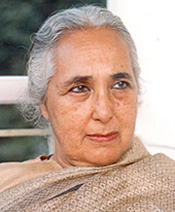Why Awarded
The pre-eminent historian of early India, Thapar formulated new questions about the social development of nearly 2,000 years of Indian history and challenged existing historical paradigms of both the colonial era and from the more recent nationalist period. Her research has profoundly changed the way India’s past is understood both at home and across the world. Thapar has written or coauthored 15 substantial books, and her work has reached beyond the academy and into school textbooks. Her perspective on Indian history has also placed her in the midst of contentious debates. Thapar has persistently championed a history grounded in evidence drawn from multiple sources in multiple languages from all levels of society across time. She has consistently sought to counter simplifications not supported by the evidence and foster appreciation for a pluralistic view of India. Thapar has made an enduring contribution to India and transformed our knowledge of Indian history.
Citation
"She has used a wide variety of ancient sources and of languages, and introduced modern social science perspectives to help us better understand the richness and diversity of traditional Indian culture."
—Librarian of Congress James H. Billington
Press
- Historians Share 2008 Kluge Prize
The Washington Post - Dec. 3, 2008 - Romila Thapar to share Kluge Prize
The New Indian Express - Dec. 5, 2008
Bio
The pre-eminent historian of early India, Romila Thapar opened the study of its rich, ancient civilization to habits of inquiry and conceptual frameworks arising out of the modern social sciences. She formulated new questions about the social development of nearly 2,000 years of Indian history and challenged existing historical paradigms of both the colonial era and from the more recent nationalist period.
Making innovative use of familiar archeological and literary sources and mining new data, she rewrote the history of this continental nation of more than 1 billion people. Her iconoclastic approach is not without controversy, but the research that she and like-minded colleagues advanced has profoundly changed the way India’s past is understood both at home and across the world.
At the beginning of her career, Thapar challenged the conventional historiography. In her "History of India" (1966), she broke from the predominant view of an unchanging India characterized by a past and static Golden Age. This work accelerated the adoption of the social sciences in Indian universities and quickly became a teaching text in Indian schools. Her research portrays complex interplay among political, economic, social, religious and other factors, and always takes a holistic approach. Faced with the absence of reliable dating, she finds new information in ancient texts–Persian, Arabic, Sanskrit and Jain–in Old Tamil traditions and folklore, and integrates it all with findings from archaeology, numismatics, linguistics and inscriptions. Thapar acknowledges the uncertainties involved in writing history in the absence of a reliable written record but presents her view of the most likely interpretation of the evidence. Thapar completely revised and greatly increased the size and scope of her "History of India" in 2002.
Thapar’s work has reached beyond the academy and into school textbooks, and her perspective on Indian history has placed her in the midst of contentious debates. Thapar's tesxtbooks on Indian history were criticized by religions organizations who felt their religious teachers had not been properly glorified. Newspaper articles and editorials protested Thapar and her fellow writers for excavating historical evidence that ancient Aryans had, on occasion, eaten beef, even though this ran counter to Hindu tradition. She was criticized for questioning orthodox opinion and encouraging young minds to do likewise. Thapar persistently championed a history grounded in evidence drawn from multiple sources in multiple languages from all levels of society across time. She consistently sought to counter simplifications not borne out by the evidence and to support, implicitly, an appreciation for a pluralistic view India.
An emeritus professor of Ancient Indian History at Jawaharlal Nehru University in New Delhi who has held visiting posts and received honorary degrees from universities on three continents, Thapar has made an enduring contribution to India and the world through her role in innovating methodologies for historical research and transforming our knowledge of Indian history.

ROMILA THAPAR
The Historian Who Rewrote India's Past
Kluge Prize Recipient 2008
Quick Facts
Born:
1931, Lucknow, India
Field:
History
Positions:
Reader, Kurukshetra University
Emeritus Professor, Jawaharlal Nehru University
Ceremony Links
Prize Awarded:
December 10, 2008
Acceptance Speech:
Watch Video
News Release:
Historians Brown, Thapar Named Recipients of Kluge Prize (Dec. 3, 2008)
Selected Publications
- "A History of India" (1966)
- "Communalism and the Writing of Indian History" (1969)
- "Interpreting Early India" (1992)
- "Early India: From the Origins to AD 1300" (2003)
